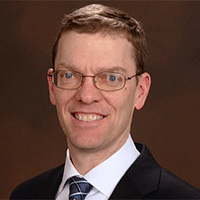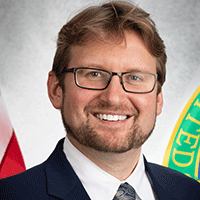Keynote - Monday, July 18th, 9:00AM – 10:30AM

Michael B. House
Vice President of Infrastructure and Energy Solutions
Siemens Government Technologies (SGT)
Keynote Title: Maximizing Renewables Penetration Through Smart Grid Control
Description: Reducing the emissions from distributed generation systems with a very high percentage of renewables is possible in combination with smart grid control. Traditional energy master plans sometimes underestimate the amount of installable photovoltaic or wind, but proper simulations and hardware selections can avoid these pitfalls, ensuring sufficient power quality, uptime and availability.
In this plenary session, Michael House will discuss some of the risk mitigation techniques needed to ensure successful renewable power projects for mission critical facilities, leveraging today’s technology and reducing the project's carbon footprint.
Biography: Michael B. House is the Vice President of Infrastructure and Energy Solutions at Siemens Government Technologies (SGT) and has been with Siemens since August, 2020. SGT exclusively serves US Government customers through Energy Savings Performance Contracts, Utility Monitoring and Control projects and Cooperative Research and Development projects centered on resiliency, energy and advanced electrical systems.
Prior to his current position, Michael was the Vice President of Energy Consulting Services in the Americas for AECOM, meeting client needs in energy planning, distributed generation, microgrids, modeling and program management.
From 2004 to 2011, Michael worked as Program Manager and Business Leader for Northrop Grumman in topics ranging from manufacturing of power control and distribution units for satellite payloads to R&D for US Government customers.
From 1992 to 2004, Michael worked as an engineer and Six Sigma Blackbelt at various locations for General Electric and Lockheed Martin and helped drive the commercialization of GE’s Mark Ve gas turbine control system.
Michael earned a Bachelor's degree in Engineering Science from The Pennsylvania State University, a Master’s degree in Engineering Mechanics from The Pennsylvania State University and a Master of Business Administration from Rensselaer Polytechnic University.
Michael is married and loves spending time with his family. He enjoys leisure travel, playing golf or just relaxing at the beach.
Plenary - Tuesday, July 19th, 12:00PM – 1:30PM

Brian J. Anderson, Ph.D.
NETL Director
National Energy Technology Laboratory
Plenary Title: Integrated Carbon Management Solutions to Enable the Transformation to a Net-Zero Energy Future
Description: Join Dr. Brian Anderson for an overview of how the National Energy Technology Laboratory (NETL) is at the forefront of technology development to accelerate our nation's transition to a clean energy future. Coverage includes pathways associated with advancing carbon management approaches toward deep decarbonization and technologies that lead to sustainable energy resources.NETL is the nation’s premier energy technology laboratory. The lab advances vital energy technologies needed to decarbonize our nation’s energy infrastructure and industries, improve electrical grid reliability and resilience, expand critical mineral production, educate America's future scientists and engineers, create good-paying jobs, expand access to energy efficiency and clean energy for families, communities, and businesses and support national energy and security goals.
Biography: As director of the National Energy Technology Laboratory (NETL), Brian J. Anderson, Ph.D., manages the complete NETL complex, including delivery and execution of the Laboratory's mission and national programs in carbon-based energy and program support to the U.S. Department of Energy (DOE) Offices of Energy Efficiency and Renewable Energy; Electricity; and Cybersecurity, Energy Security and Emergency Response. Anderson leads NETL's more than 1,300 employees and guides more than 1,000 R&D projects in 50 states with a total award value of $5 billion. As director, Anderson fosters strategic relationships with utility and academic institutions, state and local governments, and important carbon management stakeholders. Under Anderson’s leadership, NETL initiated critical technology development and deployment projects including direct air capture technologies for decarbonization, chemical looping combustion with potential to reduce greenhouse gas emissions, and non-variable renewable energy for future low-carbon power systems. Anderson also guided the development and maturation of key technologies proven to have significant industry impact including microwave ammonia synthesis and carbon nanomaterials manufactured from coal. In April 2021, the Biden Administration named Anderson executive director of the Interagency Working Group on Coal and Power Plant Communities and Economic Revitalization. In this role, Anderson strategically leverages NETL’s resources and expertise to help ensure the shift to a clean energy economy creates good-paying union jobs, spurs economic revitalization, remediates environmental degradation and supports energy workers in coal, oil and gas, and power plant communities across the country.
Anderson is the recipient of the 2020 Federal Laboratory Consortium Laboratory Director of the Year award, and Secretary's Honor Award and Presidential Early Career Award for Scientists and Engineers for his research. Anderson earned his bachelor's degree in chemical engineering at West Virginia University and his master's and doctorate in chemical engineering from the Massachusetts Institute of Technology.